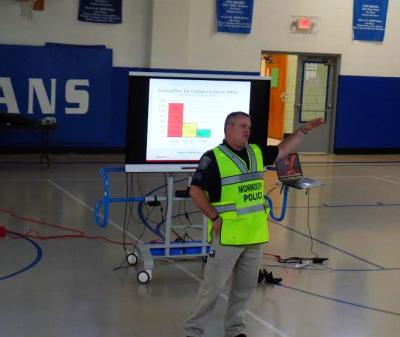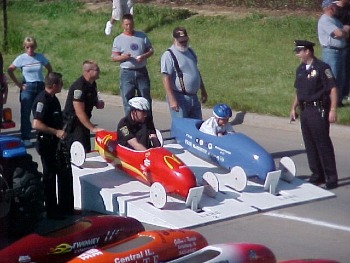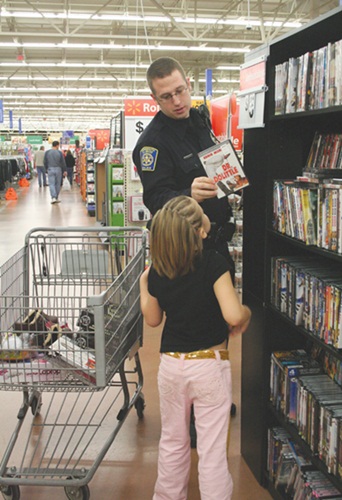MPD Programs
Special Needs Consideration
Warren County 911 Dispatch maintains a database of special needs considerations that are relayed to first responders during an emergency.
If you or your family have information that should be considered during a response, please fill this form out and return it to the Police Department either in person or by mail.
Monmouth Police Department Programs
ALICE Training in Our Schools
ALICE (Alert, Lock Down, Inform, Counter, Evacuate) training helps citizens respond to an active killer situation. Sgt. Joe Bratcher of the Monmouth Police Department began ALICE training with local schools in 2016. The training helps empower teachers and students to make effective decisions and take action in a dangerous situation.
During the first phase of the training, school staff learns the principles of ALICE and participates in a live drill with police department employees. The next phase includes students in a live drill of an active killer scenario; the teacher makes the decision to evacuate or barricade in their classroom or other area. After the drill, the entire school evacuates to a safe zone, where they practice the procedure for reuniting students and parents. Training will be ongoing and may eventually include first aid and de-escalation training.
All Warren County schools are now ALICE-certified. Teachers at Immaculate Conception School were ALICE-trained six months ago and have been teaching their students what they learned. On May 12, 2017, Sgt. Bratcher (pictured below) spoke to the students in grades 4-7 for the first time. He told them that the old lockdown procedures where students would cower in their classroom are over. That type of passive behavior isn’t taught anymore.
“Don’t just sit there. You have to do something,” Bratcher said. “Throw a book or use a fire extinguisher. You’re trying to buy time for the police to get there. We need 5 to 6 minutes.”
Teachers and students learn techniques that help them to fight back and disrupt the intruder’s focus. “Think through the stress and fear. Focus on what you need to do. Listen to your teachers,” said Bratcher.
Following his talk, police department employees participated in a live drill in the ICS hallways while students remained in their classrooms. ICS now has cameras that are linked to the police department. They are the first school in Illinois with this connection. During the drill, ICS Principal Randy Frakes could see what was happening via the cameras and reported the intruder’s location over the loudspeaker.
Kenny Helms, the director of information technology for the City of Monmouth, played the role of the intruder. “Kenny’s an awesome bad guy,” said Bratcher.
The live drill is helpful for the police as well. It gives them more experience learning how a group may behave in this type of situation. “An event like this is organized chaos,” said Bratcher. “It’s important to have a plan.”
Sgt. Bratcher became certified as an ALICE trainer by attending an ALICE Training Institute program held in Bloomington. He also took a 40-hour online independent study program from FEMA in 2013 about responding to rural active critical incidents. “This was one of the best courses I’ve ever taken,” he said. “It made sense and lined up with what the Army taught us.” (Bratcher has served in the Army for 20 years.)
Sgt. Bratcher doesn’t expect to have a situation like this in Monmouth. “I have a better chance of winning the lottery,” he said. “But that doesn’t mean we shouldn’t train for it. These are life-saving skills that students may use anywhere."

House Watch
MPD offers a limited security service to citizens who are out of town. If you are gone for at least five days, officers will check your home for such things as open doors or broken windows. This service is provided for a maximum of 21 days per year. After 21 days, homes will be put on an "extra patrol" list. To sign up for this service, come to MPD at 500 South Main to fill out a request.
Bike Registration
In an effort to reduce the number of lost or stolen bicycles, MPD will register any bike free of charge. If you would like to register, bring your bike and its serial number to 500 South Main Street. You will be issued a sticker with a registration number to affix to your bike. If your bike is ever recovered, Officers can use your registration information to return your bike to you immediately.
Bikes for Kids
In 2001, when Officer Bob Myers conducted a bicycle test for second grade students, he noticed that a couple of the kids had difficulty because they didn't have a bike to practice on at home. Officer Myers believes that every kid should have a bike, and he made a request to donate unclaimed bikes to these kids. The local newspaper was informed of the story and published an article. Since then, citizens began donating funds and new and used bikes for this program. Funds have been used to purchase new bikes and accessories such as training wheels. Through this program, officers are able to help about 15 kids get bikes every year.
If you know of any child in need of a bike, or if you would like to donate to this program, please contact PSO Robbin Sage at (309) 734-8383.
Junior Police

MPD's Junior Police Program was founded in 2001 by former Chief of Police Gary Morefield. It is a youth program for 3rd, 4th and 5th grade students from Monmouth and ICS schools. The purpose of this program is to establish some activities of interest for the youth and at the same time, help create better relations between the youth and MPD Officers. The major event sponsored by this program is the Downhill Race which incorporates soapbox derby type cars.
The event is privately funded with no cost to the City of Monmouth or to the participants.
Cops with Kids
The Fraternal Order of Police conducts a fundraiser every year to support programs such as Shop With a Cop. Donations are used to buy Christmas presents for approximately 20 local children. Each child is accompanied by either a Monmouth Police Officer or a Warren County Sheriff Deputy while choosing their gifts. The children and their families are then treated to a pizza party. Shop With a Cop is another program which serves the community and also provides positive interaction between officers and the children.

Stranger Danger
What does a stranger look like?
- Strangers can be men or women, young or old.
- They can have any color skin.
- Some are tall and some are short, some are thin, and some are heavy.
- Some strangers are pretty and some are not so pretty.
- Some strangers can speak different languages.
- Most strangers are nice, but some strangers are mean.
Because you don’t know if someone is a good stranger or a bad one, you should not talk to anyone you don’t know.
Stranger Danger Tips for Children
- Always tell your parents where you are.
- Try not to walk anywhere alone.
- Don’t take shortcuts through a wooded area.
- Bad people do not always look mean or scary.
- Do not get close to strangers.
- Do not tell your name or address to a stranger.
- Never go with a stranger to look for a lost pet.
- Never get into a car with anyone you don’t know.
- Never enter someone’s home or place of business without a parent.
- If a stranger bothers you, run away.
- Know safe places you can go (such as police or fire stations, or the library).
- If a stranger follows you or grabs for you, yell loud, and make as much noise as you can.
- If anyone touches you in a bad way, say “NO!”
- Tell your parents about places you don’t feel safe.
- Talk with your parents and come up with a secret code word.
- If you have to ask for help from a stranger, if possible seek help from a police officer or teacher.
- Call 911 to report a stranger.
- Never open the door to a stranger.
- Never tell anyone on the phone you are home alone.
Stranger Danger Tips for Parents
- Children should always carry some sort of identification including name, address, telephone number and emergency contact information.
- Have the identification card laminated to last longer. Keep this identification in a secure location and not attached to a backpack.
- Map your child's route to and from school with them. Walk with them from time-to-time.
- Teach your child how to use the telephone in order to dial 9-1-1.
- Avoid allowing your children to wear clothing with their name clearly displayed.
- Teach your child to tell you if anything happens that makes them feel unsafe.
- If your children are left with a babysitter, ask your children to talk about this experience.
- When using a babysitter, make sure you check out references.
- Take a look at the registered sex offenders in your neighborhood. Check with your local police or visit the Illinois State Police Sex Offender Registration page at http://www.isp.state.il.us/sor/
Parents and children should discuss the following questions:
What is a stranger? A person that you and your parents do not know.
How might a stranger try to fool you into getting into their car? By telling you that your parents couldn’t come so he/she was sent to give you a ride home.
How can you protect yourself? By asking the person to give you the family's secret code word.
What should you do if someone brought a package to your house when you're home alone? Speak to him/her through a closed door, telling them your mom/dad is resting and cannot come to the door. Tell them to leave the package on the porch.
Is it safe to accept gifts from strangers? NO!
If a stranger stops their car near you and asks for directions, what should you do? Stand at a good distance from the car, even if they ask you to come closer.
If you become separated from your family at a store or mall, what should you do? Tell someone who works in the store that you are lost. DO NOT WANDER.
What should you do if someone grabs you and starts taking you out of the store? Yell, “I don't know you!” and keep it up.
In an emergency, how can you call the police or fire? Dial 9-1-1.
What is a secret family code word used for? To let you know that it is safe for someone to pick you up.
If you come home to an empty house after school, what is the first thing you should do? Lock all the doors.
